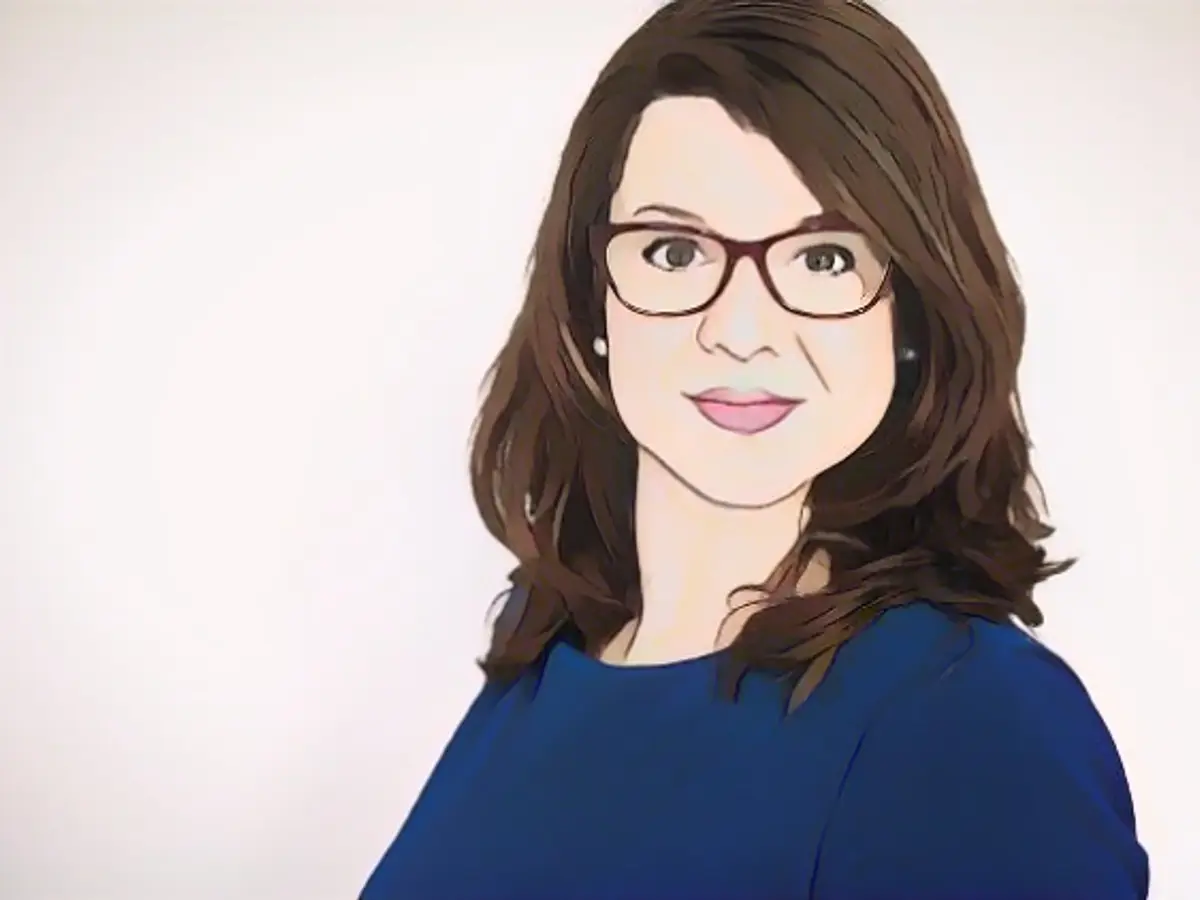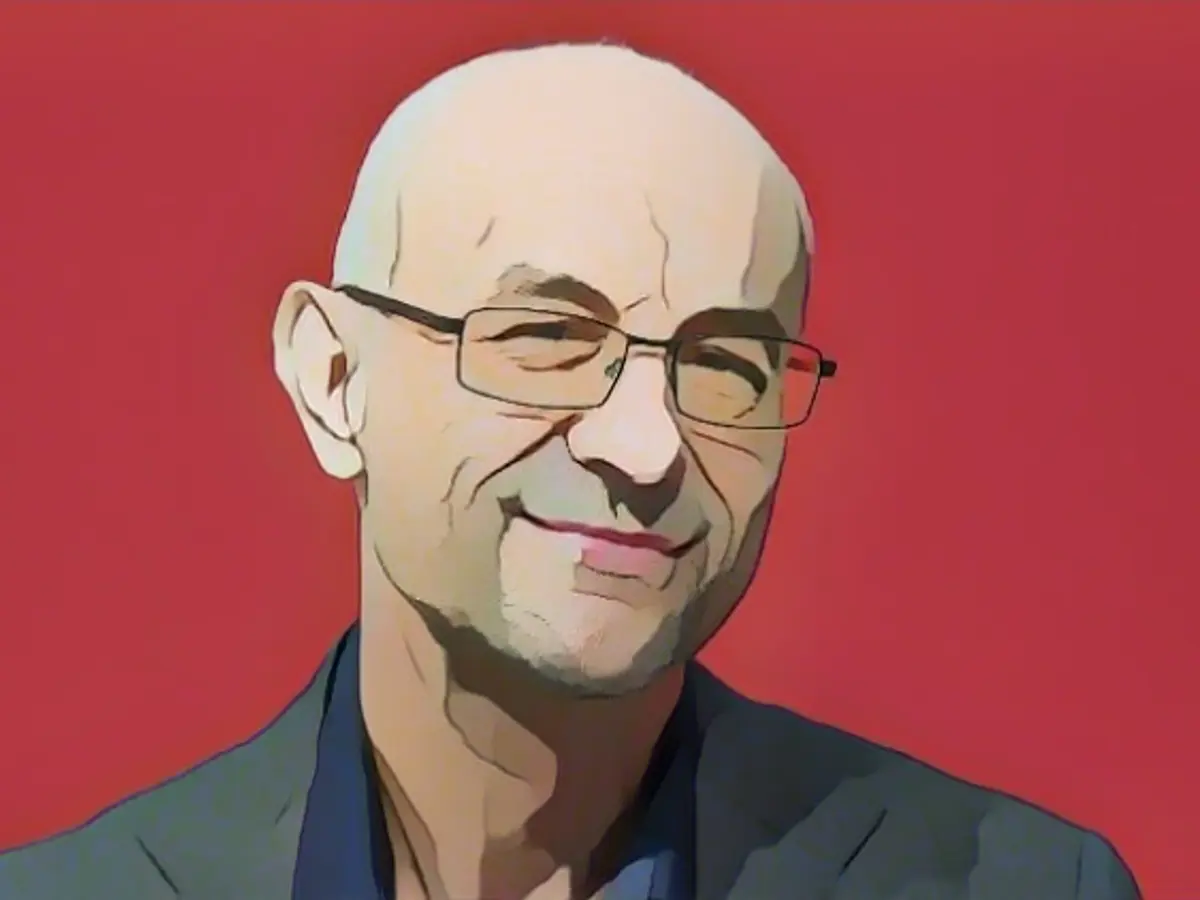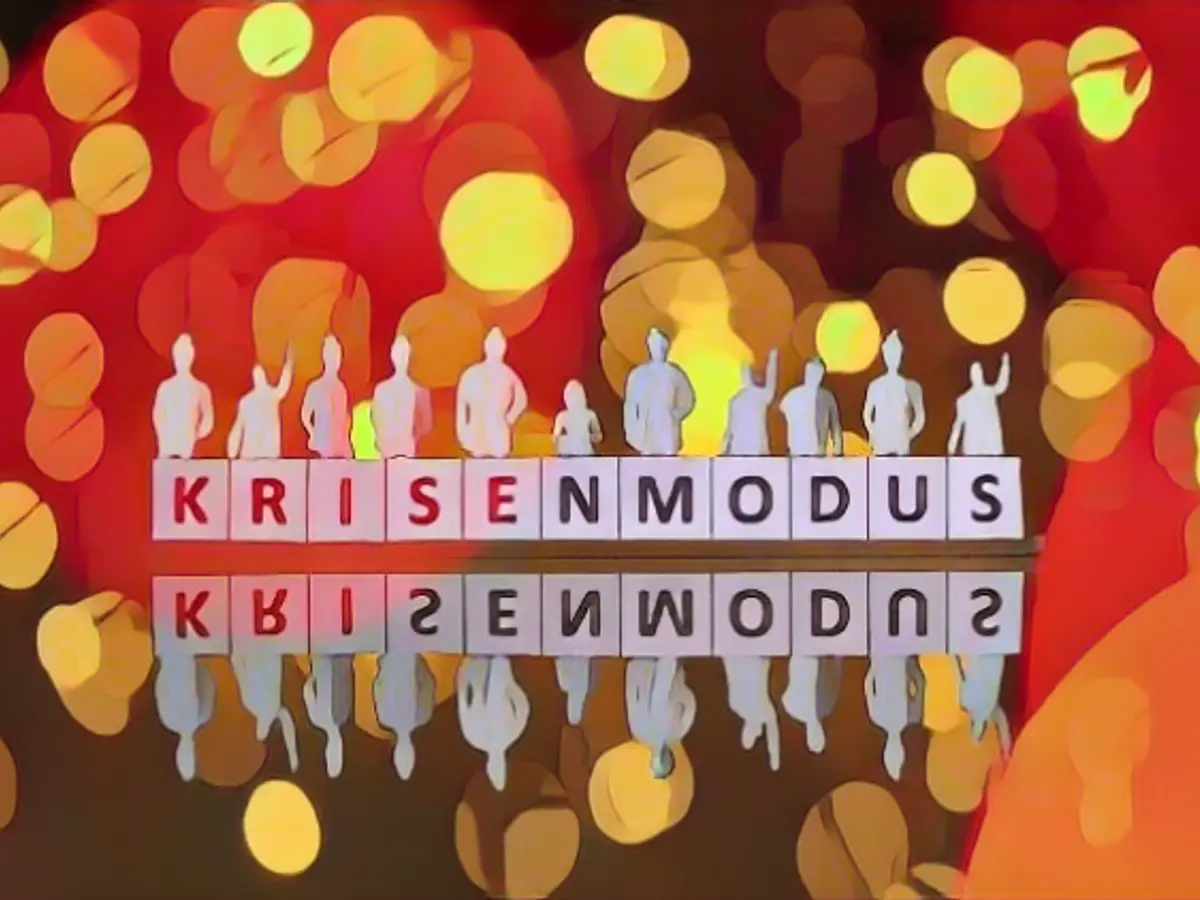"Crisis perception and mental stress are not a competition"
Germany is experiencing a kind of crisis blues in 2023: climate change, inflation and the wars in Ukraine and the Middle East are increasingly worrying Germans. A year of feeling the crisis is coming to an end and fears seem greater than ever before.
Inflation, wars and the consequences of climate change are creating a sense of crisis in Germany. The German Language Society recently named the term"crisis mode" as its "Word of the Year" for 2023. The jury explained that crises have always existed, but in the year that is coming to an end, they and their management seem to have culminated.
Rising prices in the supermarket, news of wars and violence in the media, as well as global natural disasters - everyone sees, hears and feels the crisis. At the height of the perceived crises, one cannot help but ask oneself: Was everything really better in the past?
Was everything better in the past?
"If you look at the present, you often get the feeling that the present is more affected by crises than was the case in the past. Now is a particularly crisis-ridden time," says historian Frank Biess. The crises have arrived in Germany's emotional household. An experience that many people make in times of crisis: In the face of current permanent burdens, some suffer from a kind of pessimism about the future. In contrast, the past often looks rosier through nostalgic glasses. "Of course we are better off than we were in many moments in the past." As a historian, it is easy for him to condemn worries and fears of the past as exaggerated hysteria or neuroses. "But we have the advantage of knowing how history ended. Today we know that there was no Third World War - at least not yet," says historian Biess, denying the question of whether everything was really better in the past.
In his book "Republic of Fear", he examines the emotional history of the Federal Republic of Germany, "which was repeatedly characterized by massive crises." In doing so, "the fears of contemporaries tell us something about the past - how people perceived the present back then."
Biess explains that the absence of a sense of crisis was historically rather special: "After the collapse of communism in the 1990s, there was a feeling in reunified Germany that everything was actually only getting better. There was the idea that globalization would help everyone." September 11, 2001 and the associated shock broke with this optimism about the future: Not all crises had been solved. "Since then, we have been living in a succession of crises: Financial crisis, euro crisis, refugee crisis, corona, war in Ukraine, now war in the Middle East. These are phenomena that have been around for some time: But this year, different crises are coming together to form a mega-crisis," says the historian, explaining the current emotional situation in Germany. The crisis awareness results from "the cumulative accumulation of crises, the uncertainty caused by connections that are no longer entirely transparent".
Ongoing stress
Psychotherapist Christina Jochim, deputy federal chairwoman of the German Psychotherapists' Association, also sees a climax of various crises: "We are sliding from crisis to crisis." Since the outbreak of the coronavirus pandemic, more and more stressors have been weighing on people's lives, including in Germany. Jochim emphasizes that it is completely normal for people to have more fears and worries. All of these crises would therefore trigger a personal sense of threat in each individual and thus equally great uncertainty in German society. However, as people continue to function in severely stressful crisis situations such as the coronavirus pandemic, the effects often only become noticeable much later. "We are seeing a massive increase in psychological stress, a loss of quality of life and a rise in anxiety and depression, particularly among children and young people."
In the early days of the coronavirus pandemic, there was a wave of great solidarity. However, the longer or the more people are affected, the more compassion for others decreases. The psychotherapist sees clear consequences: "Not being able to act and live according to your own values due to constant stress potentially leads to empathy fatigue, cynicism and numbness."
Fear as a survival mechanism

Increasing existential fears, latent feelings of threat and growing insecurity are also consequences of this sense of crisis. Many people perceive fear as a negative emotion, but it still has an important function: fear is a survival mechanism for humanity. "It is part of life and protects us from danger. And that's a good thing! The goal is never to have no worries, no fear," explains psychotherapist Jochim. "Fear protects us from real dangers, such as simply walking across a five-lane intersection."
Nevertheless, according to historian Biess, certain phenomena of fear also had productive effects on the history of the Federal Republic, "because they create a sensitivity for dangers and lead to dangers being perceived earlier and precautionary measures being taken. The history of democracy in Germany also has a lot to do with this, because the local fear of losing democracy has produced vigilance." Fear can therefore be a valuable warning signal for individuals and society.
The nationwide survey"Germans' Fears" has been examining the concerns of the population for 31 years. Since 1992, the R+V Infocenter has conducted annual personal interviews with around 2,400 men and women from the German-speaking population aged 14 and over, asking them about their greatest political, economic, personal and ecological fears. The representative survey always takes place in the summer - this time the interviews ran from June 12 to August 20, 2023, i.e. before Hamas attacked Israel.
According to the R+V study, the top three concerns of Germans this year revolve around finances: More than two thirds (65 percent) of respondents said they were worried about rising prices. Directly behind this, 60 percent of respondents were afraid that housing in Germany would become unaffordable. Fear of tax increases or benefit cuts came in third place with 57%. Germans therefore fear above all for their prosperity. "Financial stability has a lot to do with securing your livelihood and personal security. But money alone doesn't make you happy, of course," says psychotherapist Jochim. "People notice inflation above all in their wallets." Many feel the financial insecurity in the reality of their lives.
Fear of the state being overburdened: typically German?
Germans' fear of the state being overwhelmed by the number of refugees ranks fourth in the overall ranking. This rose by eleven percentage points year-on-year to 56%. Historian Biess recognizes a typically German fear in the fear of the state being overwhelmed and political leaders being overwhelmed: "The idea of the state being overwhelmed and the associated fear of the state not being able to get the dangers or threats under control has a long tradition in Germany." In the post-war period, there were great doubts about the state security of the still young Federal Republic, and ultimately only the Americans promised security.
In the past, fears and crises had a specific place or a specific reason, a national framework. There was at least the illusion that crises could be contained through certain measures. "But today's globalization crises cannot be overcome with the means of the nation state, so the individual nation state is actually overwhelmed," says historian Biess, explaining an important difference between current crises and those of the past. "If you think about the climate crisis today, there is no longer just one trigger for this crisis. Climate change is a new challenge of our present that did not exist in the past." At a societal level, industry based on growth from fossil fuels is one of the triggers of the climate crisis. But even our everyday actions, such as driving to work or heating our homes, have a small impact on this major issue facing humanity. The climate crisis can only be tackled globally.
Searching for culprits

One reaction to the massive uncertainty is always that parts of society simplify the complexity of the causes of the crisis: "Identifying certain groups as supposedly guilty and blaming them for the crisis, i.e. saying: 'It's the Ukrainian refugees' fault that the state is so indebted if we pay them so much'," explains the historian. This would make the "weakest and those who have the least resources, who risk their lives out of sheer desperation to somehow get better prospects, responsible for the fact that we are all supposedly so badly off."
Biess warns that populist forces could benefit from the collective crisis awareness and use people's insecurity for their own purposes. "Similar to the 1930s, many people today are asking themselves whether liberal democracy is the right way to respond to the existing problems," says the historian, recognizing a parallel between the present and the rise of National Socialism.
Politics of fear?
Psychotherapist Jochim also sees the flood of information in the 21st century media as a cause of the strong sense of crisis: "On the one hand, it is important that we know what is happening around us. So that we can make certain decisions as informed people. On the other hand, we humans are not made for this level of stimuli, over which we have no influence." In the face of fake news, manipulation and even AI, many people are asking themselves to what extent they can trust media reports? To counteract this strand of collective uncertainty, "we need trust and reliability in the media", she demands.
The historian Biess also notes that "today we live in a time in which communication with emotions is much more pronounced than it was in the past. In the 1950s and 1960s, there was still a great deal of skepticism about articulating feelings in public. It may also have been functional in the post-war period to suppress, repress or conceal feelings. It wasn't until the end of the 1960s that this idea changed." Since then, the communication of feelings has established itself as a form in society and, above all, on the political stage: the peace and environmental movements of the 1980s, for example, were supported by apocalyptic fear scenarios, also in order to mobilize politically.
Nowadays, political actors deliberately produce fears in order to achieve certain political goals. Politicians use emotions in a targeted way, also to manipulate. "Nowadays, politicians are also more willing to openly articulate their fears," says Biess. This is also part of this sense of crisis, "that we are more willing to admit our feelings".
Complaining or a change of perspective?
Although society as a social structure is affected, inflation and other crises have very different effects on the reality of people's individual lives: "We are all affected, but not everyone is affected in the same way," says psychotherapist Jochim. For example, people with a high income can compensate for certain things more easily than people who don't know how they will make ends meet at the end of the month. "Of course other people are worse off. But feelings of crisis and mental stress are not a competition, they vary from person to person. Just because others are worse off doesn't mean that you can't be worse off yourself. In a crisis, it is important not to ignore your own stress and not to "trivialize" it. It helps some people to talk a lot about their own feelings, especially in times of crisis. Complaining can also be a coping mechanism.
If that doesn't help, the psychotherapist recommends a "realistic change of perspective". Mobilizing activity as a reaction to anxiety is one way of countering feelings of powerlessness and loss of control: People should seriously consider "what can I influence, what can I not. Even if most people have no influence on the war in Ukraine, there is always something that I can influence as a person."
Another strategy that can help people deal with fear is to "put your own crisis situation in the context of your own contemporary history". Here, too, those affected should ask themselves: "Where am I really unable to do what I would actually want to do today? What was I perhaps still able to do last week? Or has not so much changed after all?"
Finally, the question arises as to what the Germans' current fears are really about. The psychotherapist's answer is clear: "In the end, it's always about being seen with your own distress."
Read also:
- Snow chaos further restricts Bavaria
- Extreme weather year: of masses of water and hurricanes
- "Zoltan" sweeps across the country - disruptions to rail traffic
- "Zoltan" brings masses of water, rail chaos and suspected tornadoes
- Despite seeing improvements in some aspects of life in the past, historian Frank Biess argues that the current global challenges such as the climate crisis, inflation, and wars in Ukraine and the Middle East have led to a historic accumulation of crises in Germany.
- The German Language Society named "crisis mode" as its "Word of the Year" for 2023, highlighting the ongoing sense of crisis permeating German society due to various economic, political, and environmental factors.
- The ongoing impact of crises on individuals in Germany has led to an increase in psychological stress, with psychotherapist Christina Jochim noting a rise in anxiety and depression, particularly among children and young people.
- While fear is often perceived as a negative emotion, historian Frank Biess emphasizes that it serves as a valuable warning signal for individuals and society, helping to identify potential dangers and enabling preventive measures to be taken.
- According to a nationwide survey called "Germans' Fears," the top concerns for Germans in 2023 revolve around financial stability, specifically worries about rising prices, housing affordability, and tax increases or benefit cuts.
Source: www.ntv.de






